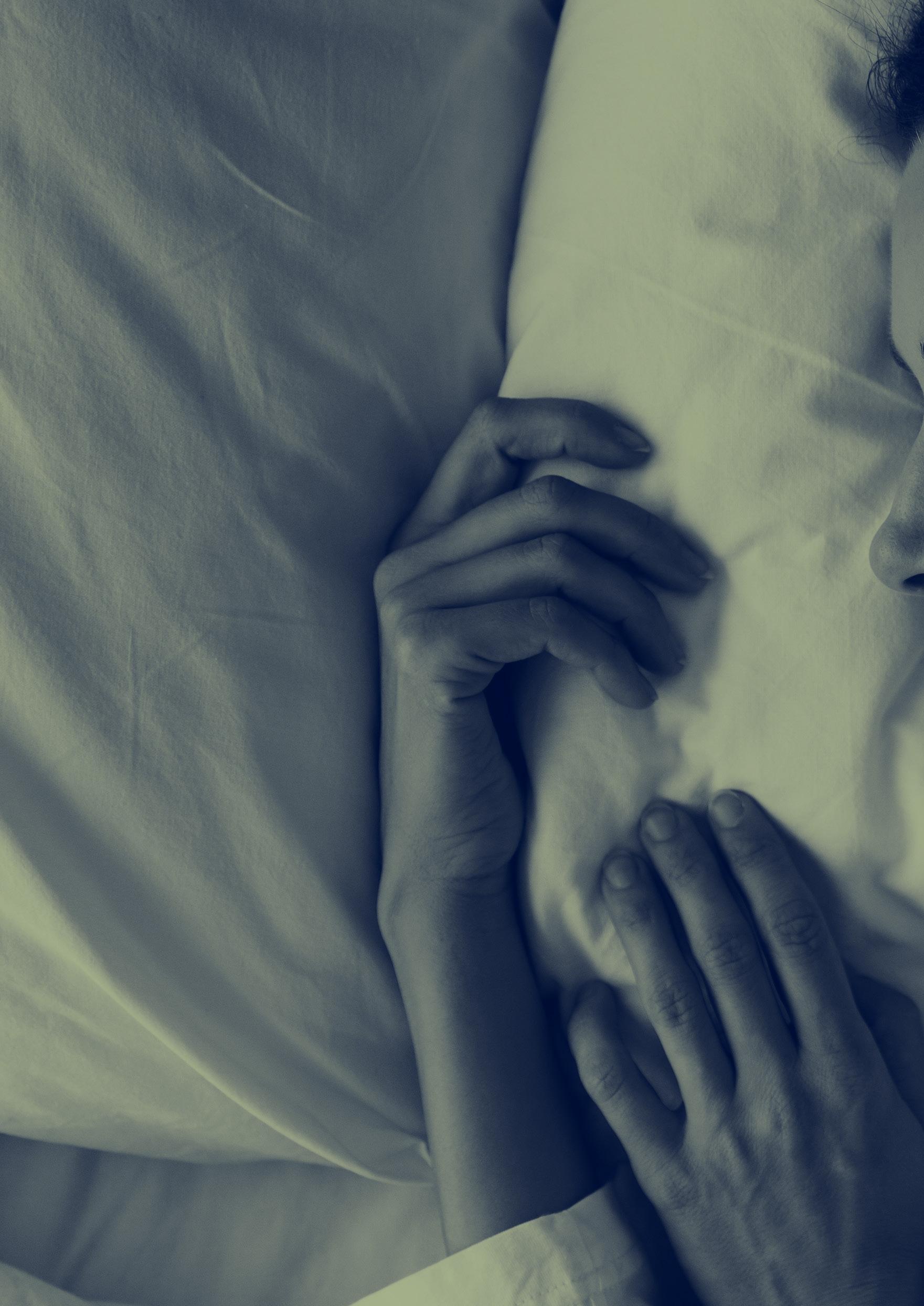
8 minute read
SLEEP FOR MIDWIVES
DR ALEX BARTLE MB, BS, FRNZCGP, DIP OBST, MM (SLEEP MEDICINE)
SHUT-EYE AND GETTING OFF THE LOOP: IMPROVING SLEEP QUALITY FOR MIDWIVES
At one time or another, midwives are bound to have experienced trouble sleeping, whether as an isolated event, or a more pathological pattern. The intensity of midwifery, combined with unrelenting shift or on-call work can lead to sleep disturbances and/or cyclic thought patterns whereby midwives replay events from their day, questioning their decisions and/or worrying something has been missed. Dr Alex Bartle, Director of Sleep Well Clinic, generously shares his insights into the world of sleep for midwives and offers practical tips for those instances when the land of nod remains elusive.
Being a midwife is one of the most rewarding professions, but with it comes responsibility and stress. The ability to be able to switch off after a birth or shift, whether it has been straightforward or complicated, is not always possible, with one potential consequence being difficulty sleeping.
Sleep is one of the essential pillars of health and is such an active process that denying sleep will negatively impact on all aspects of our physical, cognitive and emotional health. Whether on shifts or on call, nighttime work is inevitable for midwives. In the literature, the definition of shift work varies, but is generally considered to be working any hours after 7pm and before 6am, not just overnight. Up to 20% of the adult workforce can therefore be considered shift workers. For LMC midwives, being on call for extended periods of time means night work is less predictable - in timing, frequency and duration. Consequently, managing workload is vital, although not always possible.
Approximately 20% of those working shift work will suffer from ‘shift work sleep disorder’ implying that they struggle with changes to their circadian rhythm. Therefore, there will be some who struggle with this unnatural sleep/wake cycle.
Working as an employed midwife, shift work is often more structured, when compared to the unpredictable nature of working as an LMC midwife, although a number of core midwives also have on-call responsibilities to staff maternity facilities if required. Shift work schedules can vary widely depending on potential workload, but generally a rotating shift work pattern is the least helpful for sleep, and indeed for family and social life. Short periods of night work can be tolerated more easily than working five to seven consecutive nights, and eight to ten hours are preferred to 12-hour shifts in a profession that requires periods of intense concentration. LMC midwives may be on call 24 hours a day, for lengthy periods of time, depending on how they have set up their practice arrangements.
Most people will need seven to eight hours sleep per night, which can be achieved in one, two and occasionally three episodes. However, consistently less than six hours sleep will undoubtedly impact on cognitive function including concentration, memory, mental agility, motivation and mood - all vitally important when involved in a potentially life-challenging activity. We have all suffered nights of little or no sleep, either with work or with young families, and cope well as long as we are eventually able to return to adequate sleep. The key is to ensure that you are well rested when needed for work, or an important personal situation or event. There is now irrefutable evidence that sleep is vital to functioning at our best. How then to cope with this challenge to sleep?
There are a number of strategies that can be used to ensure healthy sleep for night workers. Maintaining wakefulness at
work during the night may be helped with consideration of a few ideas:
• If you are supporting a labouring woman in a dimly lit room, intermittently popping out into a brightly lit space may be helpful.
• Keeping physically active is also important, as is being engaged and chatting with others in the environment, if at all possible.
• Soothing music that may help a mother relax is also likely to increase sleepiness, so again, taking short breaks from the birthing room will aid in maintaining alertness - even if it is only possible to step out into a corridor for a few minutes.
• As the night progresses, between 3-5am, sleepiness is greatest, and keeping active at that time will be even more helpful. However, when needed, your adrenaline will help, in addition to being well rested beforehand.

Travel home following births in the early hours of the morning can be challenging and driving accidents are common at this time. A 15-20 minute nap before driving home can be very restorative, especially if there is a long drive home; however, it may impact on the ability to sleep once home.
Keep your home dimly lit, and ensure that you are sufficiently relaxed before going to bed, especially after a stressful shift or birth. Write down any worries that you may have in a journal, and consider using meditation techniques rather than medication. Going to bed soon after getting home is also better than staying up. That may not always be possible with children, but wearing sunglasses if you are out in the morning will help.
Other activities should be postponed if possible. A quiet, cool and dark room is also important, without cellphone or TV. Blue light emitted from screens and LED lights has been demonstrated to suppress melatonin, which can lead to difficulty falling asleep, so avoid using your phone for any length of time before sleep. Two phones might be helpful: one for family and social life which should be switched off; the other for women who may need to contact you at any time.
Supportive practice arrangements can mitigate the need to remain on call whilst sleeping following a night-time birth. For example, diverting calls to a practice partner will facilitate a period of uninterrupted sleep. Using automated systems/methods to postpone or cancel planned clinics or appointments (such as the caseload text messaging function through MMPO’s Tiaki app) before going to bed, will also support LMC midwives to have a longer period of restorative sleep following a night-time birth. Negotiating with practice partners regarding agreed timeframes and parameters around when to call in back-up/second midwife to avoid prolonged periods of work without sufficient sleep or rest, will also support LMC midwives to avoid fatigue. Reciprocity within practices is key.
Avoid alcohol and caffeine for at least six hours before considering sleep, including coffee, tea and chocolate. If still unable to sleep, a warm bath with soothing music is likely to be helpful. It is not common to achieve more than four or five hours sleep in the morning following a night shift, so a nap in the afternoon can be very helpful. Spending time outside whenever possible during the day will always help with sleep on a normal night. Light supresses melatonin and stimulates the production of serotonin, making us more relaxed and refreshed during the day. Serotonin then chemically converts to melatonin with darkness and helps sleep. Outdoor light is hugely more intense than indoors, even on a cloudy day, and therefore helps night-time sleep.
A frequent concern relates to waking in the night with thoughts racing, and being unable to quell the anxieties that these typically evoke. This is particularly common with those taking responsibility for critical, lifechanging events. When awake in the night, molehills often become mountains and we tend to catastrophise. If this sounds familiar, the following strategies may help:
1 / Consider debriefing with a colleague, manager, mentor or College advisor following any particularly stressful or traumatic event, before attempting to sleep.
2 / Ensure you go to bed in as relaxed a state as possible. Meditation techniques (mindfulness, prayer, self-hypnosis, transcendental meditation) and/or journaling (writing down worries) as previously mentioned, can help some people before retiring to bed.
3 / Two helpful sites are: www.calm.auckland. ac.nz and www.headspace.com. Learn the techniques so that you can use them in the night or whenever the mind starts to take over.
4 / Understand and be reassured that everyone wakes in the night; few however are aware that they do. Just before we fall asleep, there is a 2-3 minute period of amnesia, which happens again when we wake in the night, making us unaware that we have woken and rapidly returned to sleep.
5 / Avoid clock-watching. Have an alarm clock that you can neither see, nor touch, as this only serves to heighten anxiety levels. Do set an alarm however, as this will reduce anxiety about waking up on time.
If you are starting to worry and find returning to sleep difficult, engage learned relaxation strategies to try to calm your mind. If this is proving unsuccessful however, the next step is to get out of bed and follow this procedure:
A / Before retiring to bed, set up a place in the house to go in preparation for a possible night of ‘worried wakefulness’. Make sure it is somewhere that is warm, dimly lit, has writing and/or reading material available. NO computers, cellphones or other screens. The idea is to calm the anxious, worrying brain.
B / After 15 minutes, return to bed. If you again become anxious, get up and repeat the process until you go to bed and fall asleep. This procedure is designed for the brain to associate bed with sleep, and not anxiety. A study on this process showed over 70% of participants only needed to get up once.
Finally, one of the most challenging times for families is with children during the school holidays, and this highlights the fact that shift work impacts on the whole family. In such situations, communication with partners and children is vital so that they understand the importance of your sleep, and that you may not be available while prioritising your own sleep.
While there is much emphasis on good nutrition and adequate exercise, sleep is equally important to function well, both in our daily lives and especially in our work, therefore it should be treated as a necessity, rather than a luxury. square










